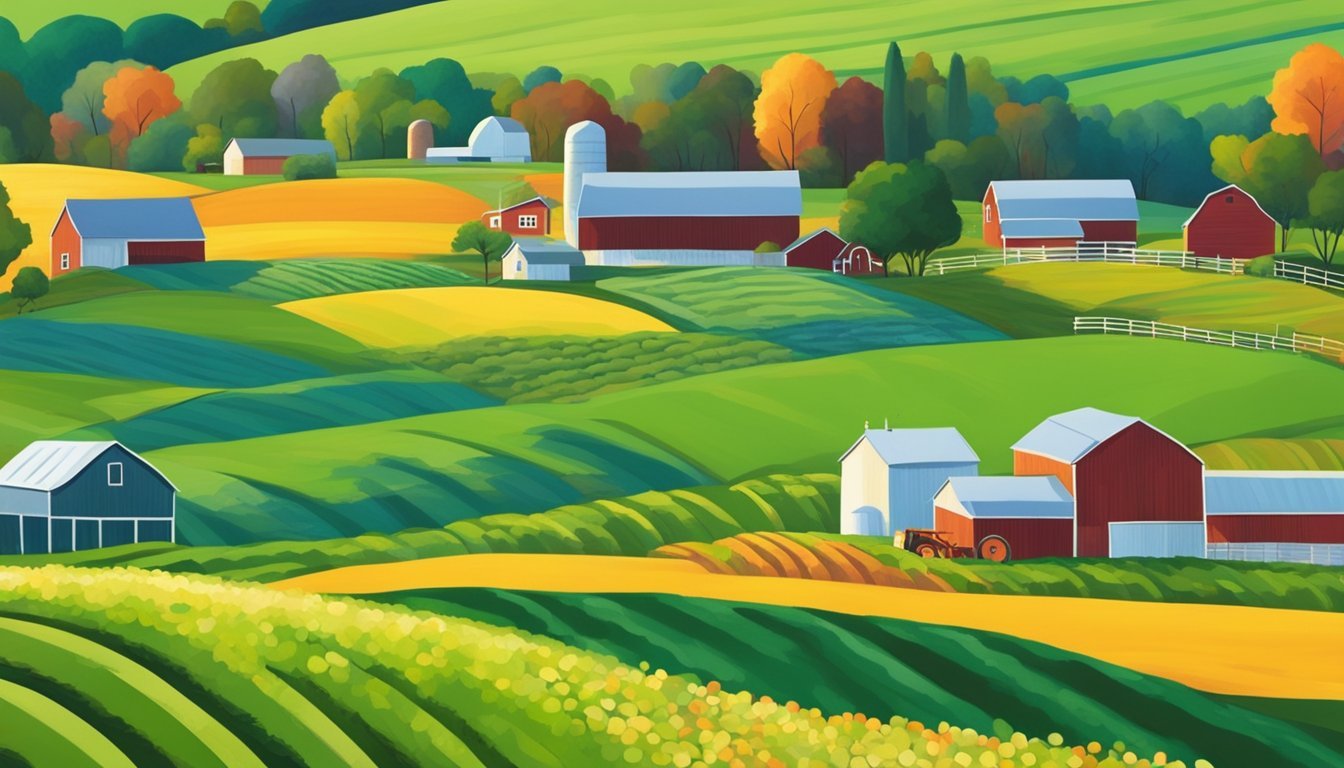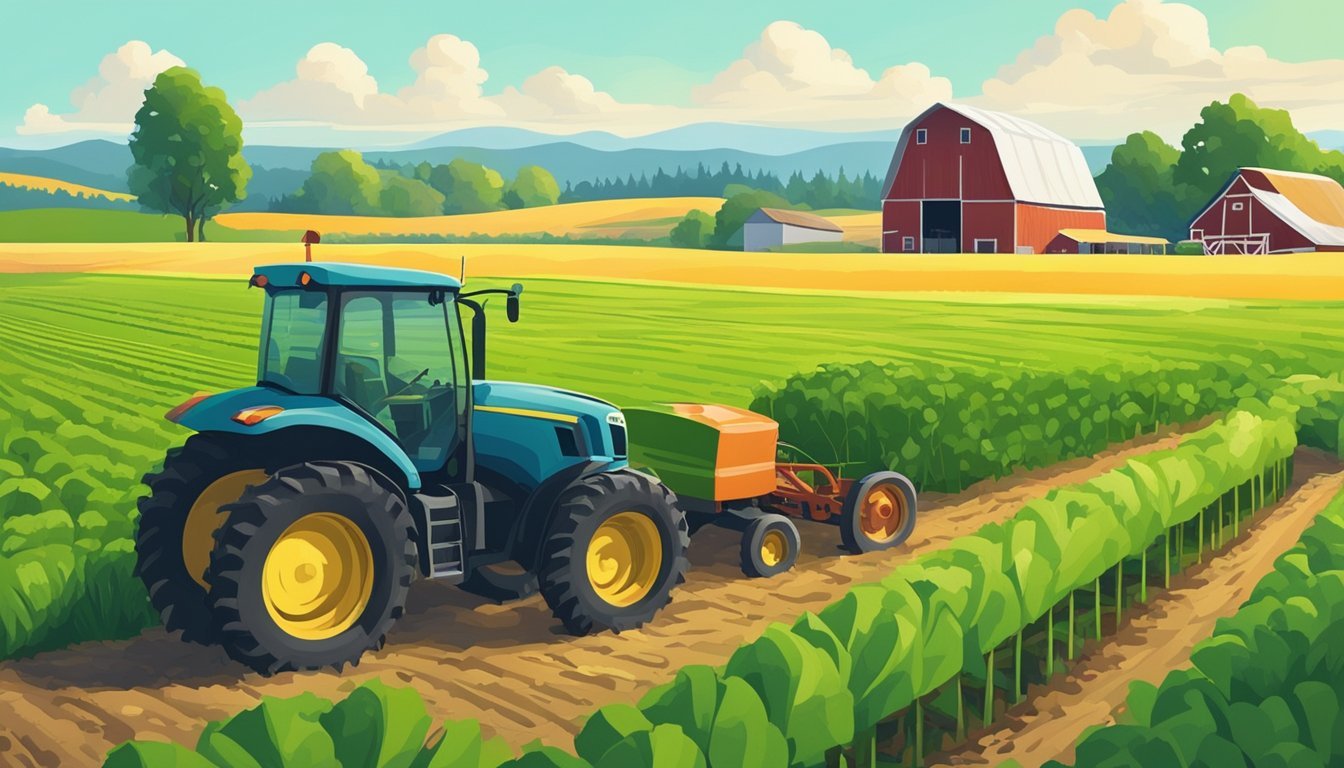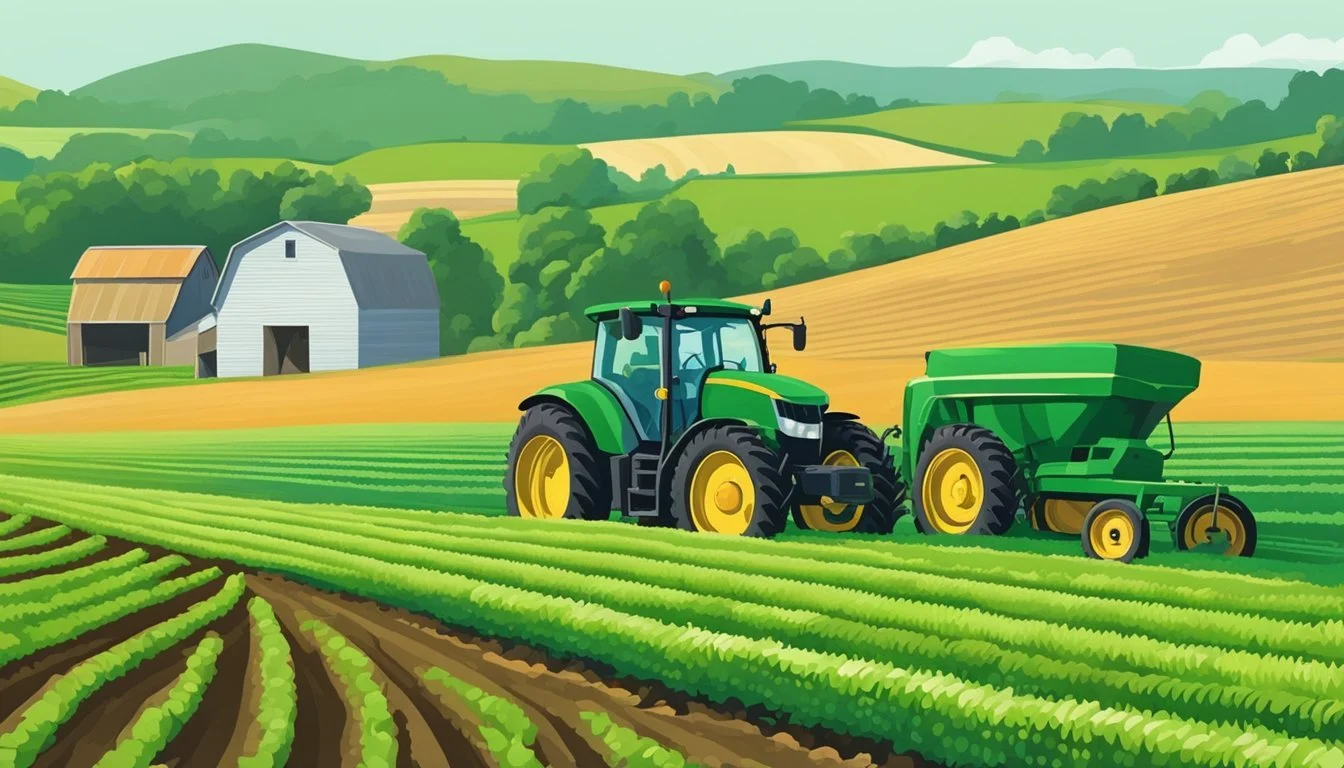Guide to Farming in New York
Essential Tips for Success
This Article is Part of Our State by State Farming Guide
Farming in New York State presents unique opportunities and challenges, given its diverse climate and landscape. With both thriving urban markets and vast rural areas, New York offers potential for various types of agriculture from small-scale organic farms to large dairy operations. Farmers in the state have a wealth of resources at their disposal including comprehensive guides and handbooks developed by organizations such as Cornell Small Farms and the USDA, which offer valuable insights into sustainable farming practices, regulatory information, and business planning tailored to the region's specific conditions.
Navigating the regulatory environment is a critical aspect for any new farmer. New York State's Department of Agriculture and Markets provides key resources that detail legal and tax-related matters relevant to the farming industry. In addition, recent amendments in state law, such as changes to the New York State Agriculture and Markets Law, aim to support the farming community by connecting consumers with local producers and enhancing the food supply chain across the state.
The entry into farming requires careful planning and understanding of the local agricultural landscape. Potential farmers must consider land availability, whether through purchase or lease, and be mindful of the condition of the land both at the start and end of their tenure. New York's diverse climate zones also demand a well-thought-out choice of crops and farming practices. For those looking to start or expand their farming operations in New York, tapping into the state-specific guides and resources equips them with the necessary knowledge to establish a sustainable and profitable agricultural business.
Understanding the New York Farming Landscape
New York's farming landscape is diverse and dynamic, shaped by a blend of traditional agriculture and innovative urban farming practices. This landscape faces unique challenges and experiences trends that influence its development and sustainability.
Overview of Agriculture in New York State
Agriculture in New York State is a significant sector, with the state producing a wide range of products from dairy to fruits and vegetables. Dairy farming is the most dominant, contributing extensively to the state's agricultural output. Farms are spread across the state, but are particularly concentrated in regions like the Finger Lakes, Hudson Valley, and the North Country.
Significance of Urban Centers in Farming
Urban centers, particularly New York City, have given rise to a burgeoning urban agriculture movement. Rooftop gardens, community-supported agriculture (CSA) programs, and vertical farming initiatives have gained prominence, offering fresh produce in areas that were once considered food deserts. This development not only enhances access to healthy food options but also supports local economies and community development.
Trends and Challenges Facing New York Farmers
Farmers in New York face a variety of challenges:
Land Affordability: Farmland prices are rising, making it difficult for new and expanding farmers to secure the land they need.
Climate Change: Farmers must adapt to changing weather patterns, which can affect crop yields and livestock.
Workforce Development: There is a need for skilled labor, which is addressed by various resources and support programs for new farmers.
Simultaneously, trends include:
Sustainable Practices: There is a growing adoption of sustainable and organic farming practices.
Technological Advancements: Innovations such as precision farming are being integrated to improve efficiency and production.
Farmers and stakeholders are continually adapting to these trends and challenges to ensure the longevity and prosperity of New York's agricultural landscape.
Starting a Farm in New York
In New York State, beginning farmers embarking on the journey of starting a farm are confronted with numerous considerations from land acquisition to compliance with regulations. Resources and networks provide a lifeline for novices, and sustainability plays a significant role in the region's agricultural planning.
Acquiring Land and Understanding Regulations
Land Access: Prospective farmers can buy or lease agricultural property, with each option presenting unique advantages and obligations. Leasing often requires the land to be restored to its original condition upon contract conclusion.
Regulations: New York State's farming regulations encompass land use, crop management, and livestock regulations. Farmers must navigate these to ensure that their farming practices comply with state and local laws.
Resource and Network Access for Beginners
Networking: Beginners have access to a wealth of resources, including Cornell Small Farms' educational programs and the USDA’s discovery tool tailored for farm planning assistance. Local cooperative extensions serve as valuable platforms for knowledge sharing and support.
Resources: ATTRA and the New York Department of Agriculture and Markets offer resources specifically aimed at new farmers, providing them with necessary information to start and nourish their operations.
Planning for Sustainability and Environmental Impacts
Sustainability: With an emphasis on long-term viability, planning for sustainable practices is critical. Incorporating cover crops and understanding the environmental implications of farming help in maintaining soil health and reducing erosion.
Environmental Impact: Farmers must work with local Soil and Water Conservation District offices to develop, execute, and assess solutions for environmental challenges, ensuring their practices are both ecologically responsible and agriculturally productive.
Farming Education and Training
New York offers extensive educational resources and training programs for both aspiring and established farmers. These resources cater to diverse farming communities, including Latino/a/x and Spanish-speaking farmers, and offer various hands-on experiences through internships and apprenticeships.
Cornell Small Farms Program and Other Resources
The Cornell Small Farms Program provides a wealth of resources to farmers in New York State. It offers training sessions, workshops, and in-person events to help small farm owners improve their business acumen and agricultural practices. The program emphasizes sustainable farming techniques and supports the development of new farming enterprises. Additionally, the Cornell Cooperative Extension serves as a vital source of technical assistance, offering research-based knowledge and education opportunities tailored to the agricultural community.
Programs for Latino/a/x and Spanish-Speaking Farmers
Training programs and resources are available specifically for Latino/a/x and Spanish-speaking farm owners. These initiatives aim to reduce language barriers and provide culturally relevant education. They focus on offering technical assistance and business planning guidance that respects and incorporates the unique needs of these communities. Through this specialized support, Spanish-speaking farmers can access vital information to navigate the agricultural landscape of New York successfully.
Internships and Apprenticeships Opportunities
For individuals looking for hands-on learning, a variety of internships and apprenticeships are available across the state. These opportunities allow aspiring farmers to work directly with experienced agriculturists. Participants gain practical experience in farm management, production methods, and the daily operations necessary to run a successful farming enterprise. These programs serve as critical educational platforms, bridging the gap between theoretical knowledge and practical application in the field of agriculture.
Operational Farm Management
Operational farm management in New York encompasses a broad spectrum of activities, ensuring that daily business responsibilities align with strategic goals, crops reach their full potential, and farms maintain balance with the ecosystem through pest control and soil health management.
Day-to-Day Farm Business Management
A well-run farm business necessitates meticulous record-keeping and financial management. Farmers must track expenses, such as equipment purchases and farm inputs like fertilizer and compost, alongside income from selling agricultural products. Implementing management practices for high organic matter soils helps maintain soil health, which is crucial for long-term farm viability. They should also be aware of various tax implications and might need to file a Federal Farm Tax return (Schedule F).
Crop Production and Harvesting Practices
The production phase requires a farmer to make informed decisions about crop choice, considering the soil pH, calcium levels, and overall plant nutrient uptake. Soil testing is essential to determine what amendments might be necessary. Crop rotation and the use of cover crops can enhance soil fertility and break pest cycles. Harvesting practices should be efficient and timely to ensure the highest quality of produce for the market.
Dealing with Pests and Implementing Soil Health
Dealing with arthropod pests of NYC vegetables and other pests requires an integrated approach. Scouting tips suggest regular monitoring of pest populations to make informed decisions. Management practices include creating habitat for beneficial insects to encourage natural pest control. Additionally, maintaining soil health through the incorporation of organic matter and proper fertilization strategies leads to robust plants that are less vulnerable to pest attacks.
Marketing and Sales for Farm Products
The success of farm products in New York State hinges on understanding local market demands, building a strong brand, and tapping into the urban farming scene of New York City.
Understanding the Market and Consumer Demands
Identifying what consumers desire and the trends in locally grown food are critical steps for producers. Market analysis reveals that New York consumers prefer fresh, organic, and locally sourced products. Farmers need to align their production with these preferences to meet the market demand effectively.
Effective Branding and Local Networking
Developing a distinctive brand and engaging in local networking can significantly enhance a farm's visibility in a crowded marketplace. Branding should convey the quality and origin of the produce, highlighting the benefits of locally grown food. Networking with local businesses and participating in community events can establish strong local ties and open direct marketing channels.
Exploring Urban Farming Opportunities in New York City
The NYC market offers a vast consumer base interested in urban agriculture’s sustainability and convenience. Urban centers like New York City provide unique platforms such as farmers' markets and CSA (Community Supported Agriculture) programs, which are vital for NYC market growers. Embracing these updates can lead to direct relationships with consumers and higher profit margins for producers.
Policy and Advocacy for New York Agriculture
In New York, agricultural policy and advocacy efforts are geared towards enhancing the sector's economic viability and ensuring sustainable operation of farms.
Legislative and Administrative Actions
Legislative action and administrative action play crucial roles in shaping the environment for farming in New York. Recent legislation such as the Farmworker Fair Labor Practices Act represents significant changes, including the right to a day of rest, overtime pay, and collective bargaining rights. Administrative bodies like the New York State Department of Labor also offer guidance to farmers, helping them navigate labor laws and tax benefits. For example, farmers enjoy sales tax exemption on farming supplies and may qualify for property tax exemptions on farm buildings and land generating over $10,000 in sales.
Grassroots Initiatives for Farm Policy Change
Grassroots efforts are essential to advocacy for farming interests. Organizations conduct research and educational programs to strengthen agriculture's future in New York. They provide:
Policy recommendations: Influencing legislative discussions with researched-backed proposals.
Public engagement: Encouraging local communities to support agricultural policies.
By mobilizing farmers and local communities, these initiatives aim to inform and impact policy at both state and local levels.
Additional Resources and Support for New York Farmers
New York offers a robust array of resources and support mechanisms for new and established farmers. These resources are designed to help farm owners navigate the complexities of farming with a wealth of information, financial planning tools, and technical support.
Fact Sheets and Field Guides
Farmers seeking to expand their knowledge can access a variety of fact sheets and field guides. These documents cover crucial topics ranging from crop management to pest control. For instance, the Northeast Beginning Farmers Project provides an extensive collection of guides that assist in various aspects of farming.
Insurance and Financial Planning
For insurance and financial planning advice, New York farmers have options. Beyond personal resources or loans from lenders, they can explore risk management strategies through state-provided information. However, it should be noted that there are no grant funds available for starting a farm. Details and guidance on insurance products tailored for the agricultural sector are provided by government agencies and private institutions alike.
Technical Assistance and Farm Owners Support
Technical assistance is available to farm owners who need support in expanding and developing their business. New York's Agriculture and Markets Department offers training, licensing, and funding opportunities. Additionally, initiatives like the Regional Navigator Program ensure that farmers receive personalized assistance, linking them with land access experts and valuable resources for successful farm management.
Fostering Community and Economic Development
The proliferation of urban agriculture is a key driver for job creation and educational outreach in New York, enhancing both economic and community development.
Urban Agriculture’s Role in Job Creation
Urban agriculture initiatives have a demonstrable effect on local job markets. These projects often require a diverse skill set, creating opportunities for employment in areas such as crop management, distribution, and urban farm maintenance. The establishment of Urban Farms and Community Gardens has further demonstrated the state's commitment to promoting local food systems and job prosperity. An emphasis on agriculture can lead to the development of support industries, ranging from equipment suppliers to value-added product creators, all of which contribute to a robust job market.
Educational Programming and Community Outreach
Educational programs integrated with urban farming efforts function to instill agricultural knowledge and foster community involvement. Initiatives such as the Guide to Farming in New York State by Cornell Small Farms address the essentials for operating a farm business, underscoring the importance of educational outreach for aspiring agri-entrepreneurs. Through partnerships with institutions and community-based programming, individuals are empowered with knowledge on sustainable farming practices and local food production. Community outreach efforts often transcend education, leading to enhanced social cohesion as residents engage with and develop a vested interest in local urban agriculture projects.
Appendix: Special Topics in New York Farming
This appendix addresses two niche but important areas in New York agriculture: specialty mushroom production and pollinator conservation, both requiring distinct considerations and tailored practices for successful operation within the state's farming landscape.
Specialty Mushroom Production and Marketing
Specialty mushroom production in New York has emerged as a viable enterprise due to rising consumer demand and relatively low start-up costs. Producers must focus on critical factors such as species selection, climate control, and substrate preparation to ensure a successful crop. Shiitake, oyster, and lion's mane are popular choices due to their robust market demand and adaptability to New York’s climate.
Marketing strategies for specialty mushrooms should highlight their local origin, organic cultivation methods (if applicable), and unique culinary attributes. Establishing relationships with farmers' markets, local restaurants, and specialty grocers can be pivotal. Additionally, producers can benefit from resources like the Cornell Small Farms Program which offers guidance on both production and marketing.
Pollinator Conservation and Beneficial Insect Habitats
Pollinator conservation is essential for New York's ecosystem stability and agricultural productivity. Farmers play a vital role by creating habitats that attract and support pollinators and other beneficial insects. Practices such as planting native flower strips, maintaining hedgerows, and avoiding pesticides harmful to bees are important steps.
The "Beneficial Insects on NYC Farms Pocket Guide" is a resource that can be used by urban farmers to identify and cultivate beneficial insect populations. By fostering habitats for insects like bees and ladybugs, farmers can enhance crop pollination and natural pest control, reducing the need for chemical interventions.
Implementing these specialized farming practices contributes to the diversity and sustainability of New York's agricultural sector, and resources are available to assist farmers in operating effectively in these areas.
Glossary
Ag Entrepreneur: An individual who operates and manages a farm as a business venture, employing innovative practices to achieve economic growth.
Zoning: Legal regulations that govern land use in specific areas, which could determine where farming is permissible within New York State.
Description: A strategic blueprint for starting and managing farm operations, including financial, production, and marketing plans.
Importance: It serves as a guide to navigate the complexities of the agricultural industry.
Labor Law:
Objective: To ensure fair working conditions and equitable treatment for farm employees.
Relevance: Farmers must adhere to these laws to maintain a lawful and ethical business.
Regulations: Set of rules that farmers must follow regarding environmental protection, animal welfare, food safety, and other important aspects of farm operations.
Marketing:
Definition: The set of strategies used to promote and sell farm products.
Application: Critical for financial success and market reach.
Taxes: Implications of various tax obligations that pertain to agricultural practices and farm income in New York State.
Fact Sheets: Purpose: They provide condensed, relevant information on specific topics for easy reference. Usage: Farmers utilize these for quick access to important agricultural data and guidelines.
References
For those interested in agriculture in the Empire State, the Cornell Small Farms Program offers an excellent starting point. Their publications, particularly the "Guide to Farming in New York State", provide a wealth of information useful to both novice and seasoned farmers.
The guide covers various aspects of farming including:
Tax Benefits: Farmers in New York State may be eligible for sales tax exemptions on farming supplies and certain tax exemptions on property.
Operational Aspects: Topics such as farm operation financing, risk management, insurance, and vehicle regulations are covered.
Regulatory Compliance: Guidance on zoning, legal issues, and environmental regulations helps farmers navigate complex legislation.
Business Planning: Essential for anyone looking to start or maintain a farming operation, with insights into marketing, labor laws, and more.
The resources are known for their comprehensive coverage of topics, updated regularly to reflect the most current information and thus being recognized by educators and agricultural professionals alike.
A quick-reference guide is also available, summarizing key points from the primary guide and making for an easy read on essential topics.
Here's a summary table of the resources available:
Resource Title Topics Covered Publisher Guide to Farming in New York State Tax benefits, farm operation, risk management etc. Cornell Small Farms Program Quick Reference Guide to Farming in New York Summarized key points Cornell Small Farms Program Urban Agriculture - Harvest New York Resource for urban farming initiatives Cornell University
These references serve as foundational materials for anyone immersed in New York's agricultural landscape.










